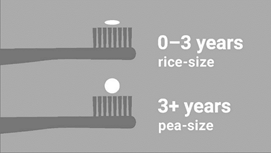Dental Care
Fluoride in children
What is fluoride?
Fluoride is an important mineral that helps prevents tooth decay. It’s found naturally in soil, air, and water.
Fluoride is available from different sources:
- Fluoride is added to over-the-counter dental products like toothpaste and mouthwash.
- Fluoride is adjusted to recommended levels in community drinking water.
- Fluoride is applied by dental health professionals.
Getting fluoride from one source provides protection from tooth decay. Getting fluoride from different sources gives you better protection from tooth decay.
Fluoride toothpaste
Fluoride toothpaste is an important source of fluoride to protect your children’s teeth.
When your child gets their first tooth, start brushing their teeth with the recommended amount of fluoride toothpaste for their age.
- For children under 3 years, use an amount the size of a grain of rice.
- For children 3 years and older, use an amount the size of a pea.
Ensure your child spits the toothpaste out.
An adult should make sure that the right amount of fluoride toothpaste is used. Fluoride toothpaste needs to be stored out of reach of children to prevent accidental swallowing.
If you think your child has swallowed several mouthfuls of a fluoride toothpaste, in Alberta call the Poison and Drug Information Service (PADIS) at 1-800-332-1414 for instructions.

Community water fluoridation
Drinking tap water with fluoride is another important source of fluoride for children. Adjusting fluoride in public drinking water helps protect against tooth decay. This is called community water fluoridation.
Many communities in Alberta follow the recommendations of Health Canada and adjust the fluoride level in the drinking water to prevent tooth decay.
Water that comes from a well may have fluoride levels that are too high. If you use well water and have children 8 years old or younger in your home, you should have your water tested. Learn more about well water testing and high levels of fluoride in drinking water.
Most bottled water sold in Canada does not have the recommended level of fluoride to prevent tooth decay. Check the label for the fluoride content. The recommended level of fluoride in drinking water to prevent tooth decay is 0.7 ppm (or 0.7 mg/L).
Fluoride applied by dental health professionals
A dental health professional can give your child fluoride application for extra protection. Talk with your dental health professional about your child’s fluoride needs.
Dental fluorosis
Dental fluorosis is caused by regularly swallowing too much fluoride. It can change the look and surface of the teeth. It is only a concern for children 8 years old and younger who still have developing teeth.
Dental fluorosis can be either mild, moderate, or severe. Mild dental fluorosis is hard to see without special training. It does not affect the function of the teeth. Moderate to severe dental fluorosis affects very few Canadian children. To reduce the risk of dental fluorosis, use over-the-counter products containing fluoride safely, and have your well water tested for fluoride levels.
To see this information online and learn more, visit https://MyHealth.Alberta.ca/health/AfterCareInformation/pages/conditions.aspx?hwid=custom.ab_dentalcare_fluoridechildhood_inst_child.

For 24/7 nurse advice and general health information call Health Link at 811.
Current as of: August 4, 2022
Author: Chronic Disease Prevention – Oral Health, Alberta Health Services
This material is not a substitute for the advice of a qualified health professional. This material is intended for general information only and is provided on an "as is", "where is" basis. Although reasonable efforts were made to confirm the accuracy of the information, Alberta Health Services does not make any representation or warranty, express, implied or statutory, as to the accuracy, reliability, completeness, applicability or fitness for a particular purpose of such information. Alberta Health Services expressly disclaims all liability for the use of these materials, and for any claims, actions, demands or suits arising from such use.
